SLVS279D March 2000 – August 2015 TPS61000 , TPS61002 , TPS61005 , TPS61006 , TPS61007
PRODUCTION DATA.
- 1 Features
- 2 Applications
- 3 Description
- 4 Revision History
- 5 Available Options
- 6 Pin Configuration and Functions
- 7 Specifications
- 8 Parameter Measurement Information
- 9 Detailed Description
- 10Application and Implementation
- 11Power Supply Recommendations
- 12Layout
- 13Device and Documentation Support
- 14Mechanical, Packaging, and Orderable Information
请参考 PDF 数据表获取器件具体的封装图。
机械数据 (封装 | 引脚)
- DGS|10
散热焊盘机械数据 (封装 | 引脚)
7 Specifications
7.1 Absolute Maximum Ratings
over operating free-air temperature range (unless otherwise noted)(1)| MIN | MAX | UNIT | ||
|---|---|---|---|---|
| VI | Input voltage (VBAT, VOUT, COMP, FB, LBO, EN, LBI) | –0.3 | 3.6 | V |
| Input voltage (SW) | –0.3 | VOUT + 0.7 | V | |
| Peak current into SW | 1300 | mA | ||
| Continuous total power dissipation | See Thermal Information | |||
| TA | Operating free-air temperature | –40 | 85 | °C |
| TJ | Maximum junction temperature | 150 | °C | |
| Lead temperature | 260 | °C | ||
| Tstg | Storage temperature | –65 | 150 | °C |
(1) Stresses beyond those listed under Absolute Maximum Ratings may cause permanent damage to the device. These are stress ratings only, which do not imply functional operation of the device at these or any other conditions beyond those indicated under Recommended Operating Conditions. Exposure to absolute-maximum-rated conditions for extended periods may affect device reliability.
7.2 ESD Ratings
| VALUE | UNIT | |||
|---|---|---|---|---|
| V(ESD) | Electrostatic discharge | Human body model (HBM), per ANSI/ESDA/JEDEC JS-001(1) | ±1000 | V |
| Charged-device model (CDM), per JEDEC specification JESD22-C101(2) | ±500 | |||
(1) JEDEC document JEP155 states that 500-V HBM allows safe manufacturing with a standard ESD control process.
(2) JEDEC document JEP157 states that 250-V CDM allows safe manufacturing with a standard ESD control process.
7.3 Recommended Operating Conditions
over operating free-air temperature range (unless otherwise noted)| MIN | NOM | MAX | UNIT | |||
|---|---|---|---|---|---|---|
| VBAT | Supply voltage | 0.8 | VO | V | ||
| VO | Output current | VBAT = 0.8 V | 100 | mA | ||
| VBAT = 0.8 V | 250 | |||||
| Inductor | 10 | 33 | µH | |||
| Input capacitor | 10 | µF | ||||
| Output capacitor | 22 | µF | ||||
| TJ | Operating junction temperature | –40 | 125 | °C | ||
7.4 Thermal Information
| THERMAL METRIC(1) | TPS6100x | UNIT | |
|---|---|---|---|
| DGS (VSSOP) | |||
| 10 PINS | |||
| RθJA | Junction-to-ambient thermal resistance | 160.6 | °C/W |
| RθJC(top) | Junction-to-case (top) thermal resistance | 54.4 | °C/W |
| RθJB | Junction-to-board thermal resistance | 80.5 | °C/W |
| ψJT | Junction-to-top characterization parameter | 6.3 | °C/W |
| ψJB | Junction-to-board characterization parameter | 79.2 | °C/W |
| RθJC(bot) | Junction-to-case (bottom) thermal resistance | N/A | °C/W |
(1) For more information about traditional and new thermal metrics, see the Semiconductor andIC Package Thermal Metrics application report, SPRA953.
7.5 Electrical Characteristics
over recommended operating free-air temperature range, VBAT = 1.2 V, EN = VBAT (unless otherwise noted)| PARAMETER | TEST CONDITIONS | MIN | TYP | MAX | UNIT | |||
|---|---|---|---|---|---|---|---|---|
| VI | Input voltage for start up | RL = 33 Ω | 0.9 | V | ||||
| RL = 3 kΩ, | TA = 25°C | 0.8 | ||||||
| Input voltage once started | IO = 100 mA | 0.8 | ||||||
| VO | Programmable output voltage | TPS61000, TPS61007 | IO = 100 mA | 1.5 | 3.3 | V | ||
| VO | Output voltage | TPS61001 | 1.2 V, | IO = 1 mA | 1.44 | 1.5 | 1.55 | V |
| 0.8 V < VI < VO, | IO = 100 mA | 1.45 | 1.5 | 1.55 | ||||
| TPS61002 | 1.2 V, | IO = 1 mA | 1,72 | 1.8 | 1.86 | V | ||
| 0.8 V < VI < VO, | IO = 100 mA | 1.74 | 1.8 | 1.86 | ||||
| TPS61003 | 1.2 V, | IO = 1 mA | 2.40 | 2.5 | 2.58 | V | ||
| 0.8 V < VI < VO, | IO = 100 mA | 2.42 | 2.5 | 2.58 | ||||
| 1.6 V < VI < VO, | IO = 200 mA | 2.42 | 2.5 | 2.58 | ||||
| TPS61004 | 1.2 V, | IO = 1 mA | 2.68 | 2.8 | 2.89 | V | ||
| 0.8 V < VI < VO, | IO = 100 mA | 2.72 | 2.8 | 2.89 | ||||
| 1.6 V < VI < VO, | IO = 200 mA | 2.72 | 2.8 | 2.89 | ||||
| TPS61005 | 1.2 V, | IO = 1 mA | 2.88 | 3.0 | 3.1 | V | ||
| 0.8 V < VI < VO, | IO = 100 mA | 2.9 | 3.0 | 3.1 | ||||
| 1.6 V < VI < VO, | IO = 200 mA | 2.9 | 3.0 | 3.1 | ||||
| TPS61006 | 1.2 V, | IO = 1 mA | 3.16 | 3.3 | 3.4 | V | ||
| 0.8 V < VI < VO, | IO = 100 mA | 3.2 | 3.3 | 3.4 | ||||
| 1.6 V < VI < VO, | IO = 200 mA | 3.2 | 3.3 | 3.4 | ||||
| IO | Maximum continuous output current | VI = 0.8 V | 100 | mA | ||||
| VI = 1.8 V | 250 | |||||||
| I ILIM | Switch current limit | TPS61001 | 0.8 V < VI < VO | 0.5 | A | |||
| TPS61002 | 0.65 | |||||||
| TPS61003 | 0.9 | |||||||
| TPS61004 | 0.95 | |||||||
| TPS61005 | 1 | |||||||
| TPS61006 | 1.1 | |||||||
| VFB | Feedback voltage | TPS61000, TPS61007 | 468 | 500 | 515 | mV | ||
| f | Oscillator frequency | 360 | 500 | 840 | kHz | |||
| DMAX | Maximum duty cycle | 85% | ||||||
| rDS(on) | Switch-on resistance | VO = 3.3 V | 0.18 | 0.27 | Ω | |||
| Line regulation (1) | VI = 0.8 V to 1.25 V, | IO = 50 mA | 0.3 | %/V | ||||
| Load regulation fixed output voltage versions (1) | VI = 1.2 V, | IO = 10 mA to 90 mA | 0.25% | |||||
| IQ | Quiescent current drawn from power source ower (current into VBAT and into VOUT) | IO = 0 mA, VEN = VI, VO = 3.4 V |
VBAT | 44 | µA | |||
| VOUT | 6 | |||||||
| ISD | Shutdown current from power source (current into VBAT and into VOUT) | VEN = 0 V | 0.2 | 5 | µA | |||
| VIL | EN low-level input voltage | 0.2x VBAT | V | |||||
| VIH | EN high-level input voltage | 0.8 × VBAT | V | |||||
| EN input current | EN = GND or VBAT | 0.1 | 1 | µA | ||||
| VIL | LBI low-level input voltage threshold | VLBI voltage decreasing | 470 | 500 | 530 | mV | ||
| LBI input hysteresis | 10 | |||||||
| II | LBI input current | 0.01 | 0.1 | µA | ||||
| VOL | LBO low-level output voltage | VLBI = 0 V, VO = 3.3 V, IOL = 50 µA | 0.04 | 0.2 | V | |||
| LBO output leakage current | VLBI = 650 mV, VLBO = 3.3 V | 0.01 | 1 | µA | ||||
| IFB | FB input bias current (TPS61000, TPS61007 only) | VFB = 500 mV | 0.01 | 0.1 | µA | |||
(1) Line and load regulation is measured as a percentage deviation from the nominal value (i.e., as percentage deviation from the nominal output voltage). For line regulation, x %/V stands for ±x% change of the nominal output voltage per 1-V change on the input/supply voltage. For load regulation, y% stands for ±y% change of the nominal output voltage per the specified current change.
7.6 Typical Characteristics
Table 1. Table of Graphs
| TITLE | |||
|---|---|---|---|
| η | Efficiency | vs Output Current | Figure 1, Figure 2 |
| vs Inductor Type | Figure 3 | ||
| vs Input Voltage | Figure 4 | ||
| IO | Maximum Output Current | vs Input Voltage | Figure 5 |
| VO | Output Voltage | vs Output Current | Figure 6 |
| VO | TPS61007 Output Voltage | vs Output Current | Figure 7 |
| IQ | No-Load Supply Current | vs Input Voltage | Figure 8 |
| ISD | Shutdown Current | vs Input Voltage | Figure 9 |
| VI | Minimum Start-Up Input Voltage | vs Load Current | Figure 10 |
| ILIM | Switch Current Limit | vs Output Voltage | Figure 11 |
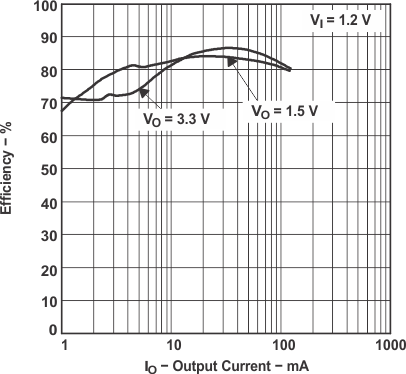 Figure 1. Efficiency vs Output Currency
Figure 1. Efficiency vs Output Currency
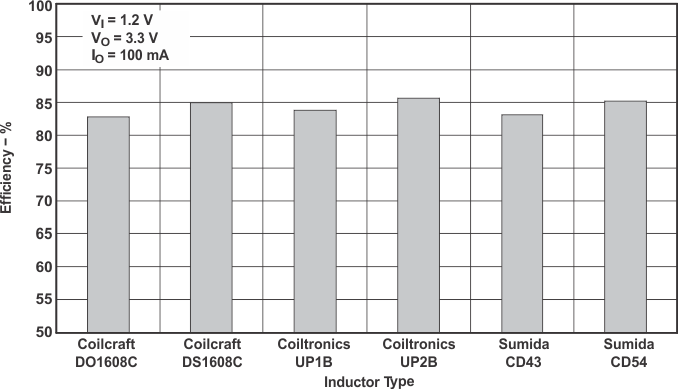 Figure 3. Efficiency vs Inductor Type
Figure 3. Efficiency vs Inductor Type
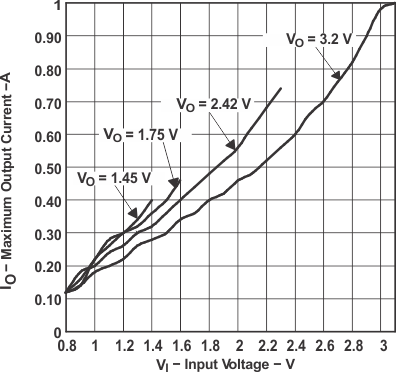 Figure 5. Maximum Output Current vs Input Voltage
Figure 5. Maximum Output Current vs Input Voltage
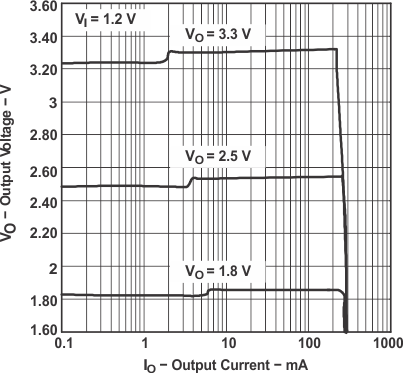 Figure 7. TPS61007 Output Voltage vs Output Current
Figure 7. TPS61007 Output Voltage vs Output Current
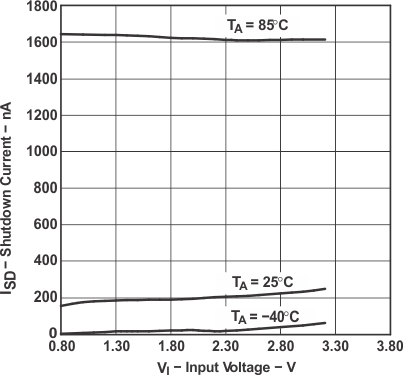 Figure 9. Shutdown Current vs Input Voltage
Figure 9. Shutdown Current vs Input Voltage
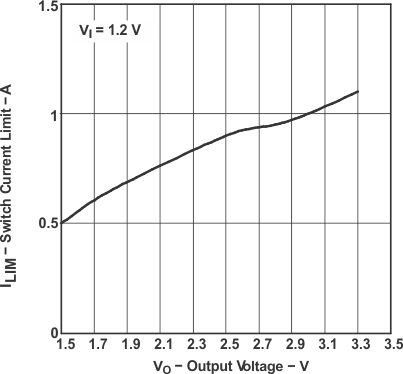 Figure 11. TPS61000, TPS61007 Switch Current Limit vs Output Voltage
Figure 11. TPS61000, TPS61007 Switch Current Limit vs Output Voltage
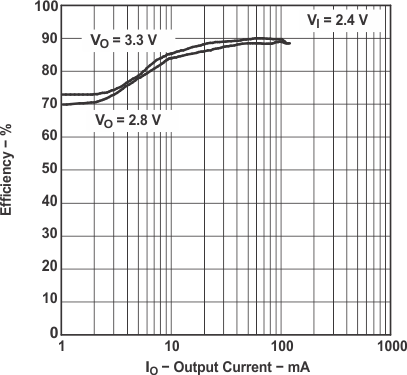 Figure 2. Efficiency vs Output Currency
Figure 2. Efficiency vs Output Currency
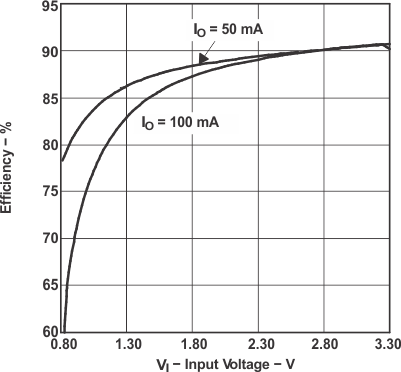 Figure 4. Efficiency vs Input Voltage
Figure 4. Efficiency vs Input Voltage
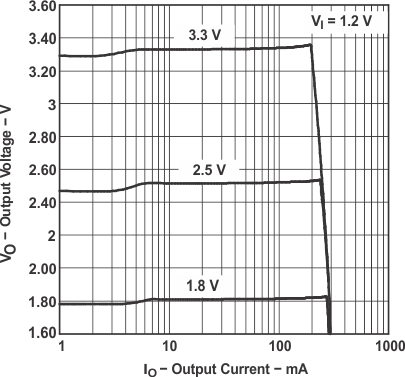 Figure 6. TPS61002/3/6 Output Voltage vs Output Current
Figure 6. TPS61002/3/6 Output Voltage vs Output Current
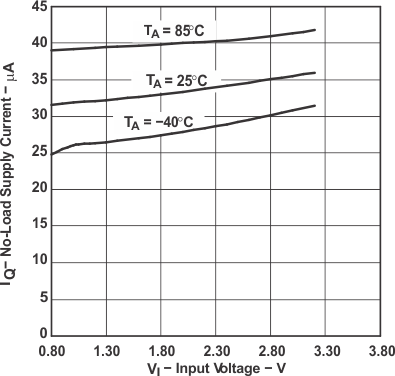 Figure 8. No-Load Supply Current vs Input Voltage
Figure 8. No-Load Supply Current vs Input Voltage
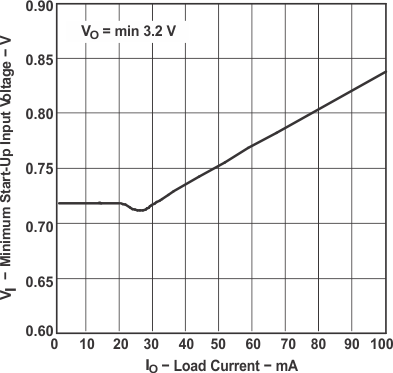 Figure 10. Minimum Start-up Input Voltage vs Load Current
Figure 10. Minimum Start-up Input Voltage vs Load Current